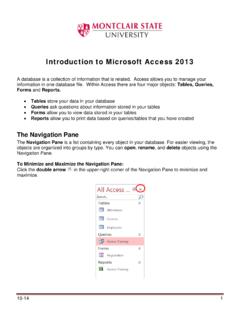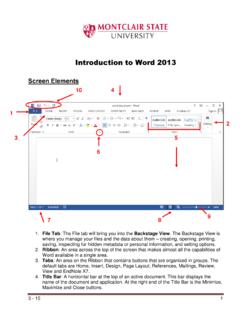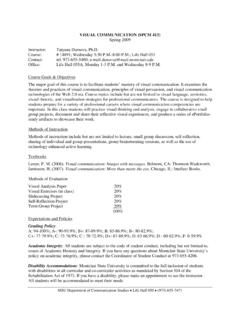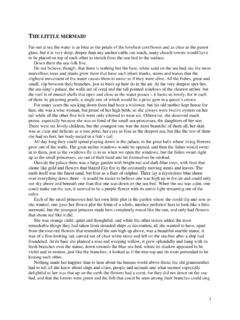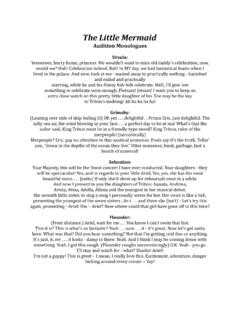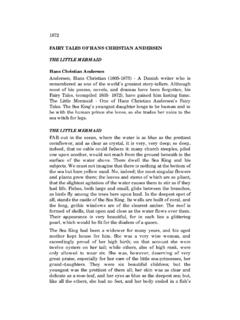Transcription of The Ideology of the Mermaid - Montclair State University
1 Pedagogy: Critical Approaches to Teaching Literature, Language, Composition, and CultureVolume 9, Number 2 doi 2009 by Duke University Press217 The Ideology of the MermaidChildren s Literature in the Intro to Theor y CoursePatricia A. Matthew and Jonathan GreenbergThis essay describes our experience with using children s literature in our English department s required course in interpretation and theory. In this class, we assign the kinds of readings commonly found in theory courses (Friedrich Nietzsche s On Truth and Lies in a Non-moral Sense, Percy Bysshe Shelley s Defence of Poetry, and Walter Benjamin s The Work of Art in the Age of Mechanical Reproduction, to name a few) and raise the now-traditional questions about gender, authorship, and canonicity.
2 But we have also found that framing the course with a consideration of children s literature situates the complicated and sometimes alienating questions theory requires in a lexicon that is seductive to students seductive precisely because our students tend to view children s literature and, by extension, the reading they enjoyed as children as uniquely free from the messy work of interpretation. In our experience, theory at the undergraduate level tends to be introduced with reference to canonical works, often through multiple readings of a single classic text through a variety of interpretive lenses, and this strategy often reinforces an existing divide in students minds between reading for pleasure and reading for school a divide that tends to be not only false but in fact counterproductive.
3 We have found that teaching and interpreting children s literature serves as an effective means to overcome or at least to begin to overcome this false working theory is that because our students encounter these children s texts during the very time of life when they are unconsciously Matthew and Greenberg The Ideolog y of the Mermaid 219218 pedagogyabsorbing ideological codes, their emotional investment in the ideological legitimacy of such texts is high so high that these texts appear, ironically, to be uniquely free of Ideology . In other words, because children s texts (such as fairy tales, Disney films, or fantasy novels) perform the actual work of Althus-serian interpellation or Lacanian quilting of the subject into the realm of the symbolic, these works are often experienced by students as singularly unsuited to any kind of analysis or critique.
4 Undergraduates who may be per-fectly comfortable assuming interpretive complexities of Hamlet or Beloved balk at the idea that Harry Potter or The little Mermaid could be an appro-priate object of intellectual inquiry, much less ideological critique. Were we to discuss Althussher or Lacan on the first day in connection with a text that students expect to find in a literature class Hamlet or Beloved students would continue to think of literature and critical reading as outside of their own daily reading experiences. They would continue to separate reading for pleasure from reading for school, and theory and interpretation would simply be strategies to be suspended once they cross the threshold from the classroom to their daily lives.
5 In other words, working with children s literature helps us to uncover the ideological investments already present but not yet visible in students reading, investments that in fact go a long way to making reading for pleasure possible in the first course we teach, The Pursuits of English, is designed to intro-duce students to the concepts and practices of critical reading and literary t he or y. It was developed during our department s two-year overhaul of the major, a project that was premised on what Lawrence Schwartz (2003: 16) referred to as the unmasking of ideological assumptions about the major requirements and [the faculty s] own pedagogies or at least the conscious recognition of these assumptions.
6 The course is specifically not designed as a survey of literary theory but, rather, to raise the foundational questions of literary study: What is literature? Why study it? What is a text? Why do we read what we read? How do we read and write? What occurs in the process of interpretation? What are the politics of interpretation? (Schwartz 2003: 19). Beyond raising these fundamental questions, the course has no prescribed boundaries; instructors choose works from whatever genres, eras, languages, and national traditions they see fit. Students are encouraged to take the course midway through the English major when they have some experience with college-level reading and interpretation but still have time left in their undergraduate careers to put into practice the interpretative strategies they encounter in the course.
7 To ensure that students experience multiple views and pedagogical practices, the course is always team and Greenberg The Ideolog y of the Mermaid 219By and large, the students at our institution come from middle- and working-class backgrounds and tend to think of the college degree primarily as a credential necessary for a well-paying job. Many of our English majors plan to teach in middle or high school after they graduate, and while they are interested in books and enjoy reading, they struggle mightily with interpreta-tion in many of their courses and are confused about why theorizing about literature might be necessary and valuable. Thus this course, because it is the sole required course for English majors, and because it requires an engage-ment with theory that may not seem terribly practical, suffers from a terrifying reputation, and a significant portion of the students enter the class anxious.
8 These students fear that reading for pleasure will no longer be acceptable and during our first meetings of the semester, many articulate quite clearly that they fear we re going to ruin literature with political correctness and overinterpretation. On further discussion, this fear generally turns out to be a suspicion that the close-reading, theme-based essays that are acceptable in traditional literature classes are only a starting point in this class and that unsettling discussions about gender, sexuality, and race will spoil the enjoy-ment they derive from other words, most of our students arrive the first day of class firm in the conviction Gerald Graff shares in Beyond the Culture Wars (1992: 83), where he writes, Every literature teacher knows deep down that his students suspect not necessarily without admiration that what he does is read into texts meanings that are not really there.
9 The process, he continues, still seems vaguely like a trick when the student learns to go through the motions well enough to get a good grade. Our students have a suspicion that they will all be required to perform tricks and literary sleights of hand and that the meaning we will all read into the texts will be politi-cally Moreover, the political inflections of interpretation inevitably become immensely personal to students; they feel implicated and harshly judged if a text they enjoy, or even one they ve read dutifully, is revealed to present characters or situations deemed racist or sexist by their professors or by critics whose work we read as a class. We have found that beginning the class with a discussion of popular children s literature proves an effective means of addressing this resistance to t he or y.
10 Raising questions of interpretation with favorite children s texts ini-tially confirms students fears about how English professors ruin literature; at the same time, however, it affirms their personal reading experiences as worthy of careful consideration. We toss them into the middle of a conversa-tion about texts that they already know the Harry Potter series, Bambi, 220 pedagogyMatthew and Greenberg The Ideolog y of the Mermaid 221 The little Mermaid within a genre to which they have deep We present during our first meeting two newspaper op-ed columns about the Harry Potter series: a somewhat notorious hatchet job by Harold Bloom (2003) and a pithy, Marxist reading by a French critic, Ilias Yocaris (2004).
